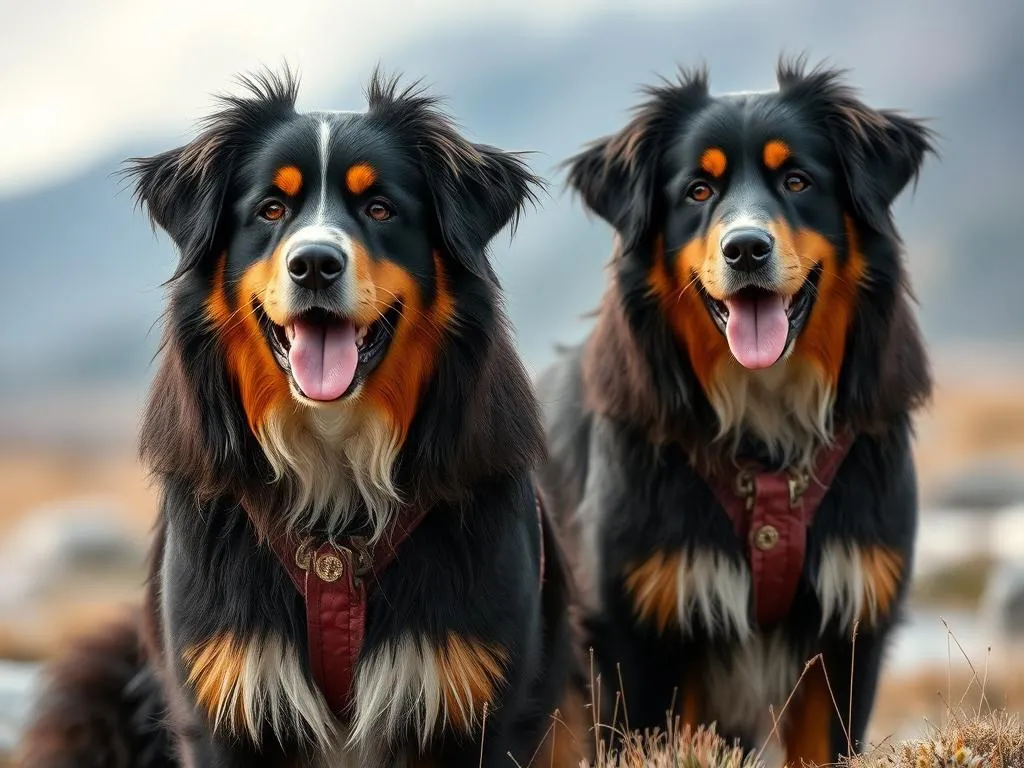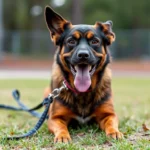
Introduction
Bernese Mountain Dogs are known for their stunning beauty, gentle temperament, and loyalty. These gentle giants can weigh between 70 and 115 pounds, making them one of the larger breeds. With their striking tri-color coat and affectionate nature, they are beloved companions and excellent family pets. However, due to their size and strength, it’s crucial to choose the best harnesses for Bernese Mountain Dogs to ensure their safety and comfort during walks and outdoor activities.
Selecting the right harness can significantly impact your dog’s walking experience. A proper harness not only provides control but also helps prevent injuries, particularly to the neck and spine. In this article, we will explore what makes Bernese Mountain Dogs unique, the importance of choosing the right harness, and provide a detailed review of some of the top harness options available.
Understanding the Bernese Mountain Dog
Breed Characteristics
Bernese Mountain Dogs are large, sturdy canines with distinctive physical attributes. They typically stand between 23 and 28 inches tall at the shoulder, with males generally being larger than females. Their weight can vary significantly, but they usually range from 70 to 115 pounds. Known for their thick, long fur, these dogs are well-suited to cold climates, and their tri-color pattern (black, white, and rust) is instantly recognizable.
In terms of temperament, Bernese Mountain Dogs are affectionate, intelligent, and eager to please. They are known for being gentle with children, making them excellent family pets. However, due to their size and strength, socialization and training from an early age are essential to ensure they are well-behaved.
Common Health Issues
While Bernese Mountain Dogs are generally healthy, they are prone to specific health issues that potential owners should be aware of:
- Joint Dysplasia: This is a common issue in large breeds, including Bernese Mountain Dogs. It can lead to arthritis and other mobility problems.
- Cancer: Unfortunately, Bernese Mountain Dogs have a higher incidence of certain types of cancer compared to other breeds.
- Bloat: This condition can be life-threatening and is more common in larger breeds. It occurs when the stomach fills with gas and twists, preventing the dog from belching or vomiting.
Understanding these health issues highlights the importance of proper care, including selecting appropriate gear like harnesses that cater to their needs.
The Importance of Choosing the Right Harness
Benefits of Using a Harness
Using a harness instead of a collar for your Bernese Mountain Dog offers numerous advantages:
- Safety and Control During Walks: Harnesses provide better control, especially for larger, stronger breeds. They distribute pressure across the dog’s body rather than concentrating it on the neck, which is essential for preventing injuries.
- Prevention of Neck Injuries: Given their robust build, Bernese Mountain Dogs can easily injure themselves with a collar, especially if they pull on the leash. A harness minimizes this risk.
Different Types of Harnesses
When selecting a harness, it’s essential to understand the different types available:
- Front-Clip Harnesses: These harnesses have a leash attachment at the front, which helps discourage pulling by redirecting the dog’s attention back to the owner.
- Back-Clip Harnesses: This type has the leash attachment on the back, making it easier to put on and take off. However, it may not be ideal for training purposes.
- No-Pull Harnesses: Designed specifically for dogs that tend to pull, these harnesses apply pressure in specific areas to discourage this behavior.
- Specialty Harnesses for Large Breeds: Some harnesses are specifically designed for larger breeds, ensuring they are sturdy and comfortable.
Key Features to Look for in a Harness for Bernese Mountain Dogs
Size and Fit
When it comes to finding the best harnesses for Bernese Mountain Dogs, size and fit are crucial. A well-fitting harness ensures comfort and safety.
- Importance of Proper Sizing: An ill-fitting harness can cause chafing or restrict movement. It may also allow the dog to escape if it’s too loose.
- Measuring Techniques for a Perfect Fit: To measure your Bernese Mountain Dog, use a soft tape measure and record the following:
- Chest circumference (around the widest part)
- Neck circumference (at the base)
- Length from neck to tail (for harness style consideration)
Material and Durability
The materials used in the harness should withstand the strength and weight of a Bernese Mountain Dog.
- Recommended Materials for Large Breeds: Look for harnesses made from heavy-duty nylon or polyester. These materials are both durable and easy to clean.
- Importance of Weather Resistance: If you plan to use the harness in various weather conditions, consider water-resistant or weatherproof options.
Adjustability
A good harness should have adjustable straps to ensure a snug fit.
- Features to Look for in Adjustable Harnesses: Look for harnesses with multiple adjustment points, allowing for a customized fit that can accommodate both growth and weight fluctuations.
Comfort and Padding
Comfort is paramount for a harness, especially for a large breed like the Bernese Mountain Dog.
- Importance of Padding for a Large Breed: Opt for harnesses with ample padding, particularly around the chest and belly, to prevent discomfort during extended use.
- Breathable Materials and Designs: Look for harnesses made with breathable fabrics to keep your dog cool, especially during warmer months.
Top 5 Harnesses for Bernese Mountain Dogs
Harness 1: Ruffwear Front Range Harness
The Ruffwear Front Range Harness is a top choice for many dog owners.
- Overview and Key Features: This harness features two leash attachment points (back and front), making it versatile for various walking styles. It also boasts a padded chest and belly for comfort.
- Pros and Cons: Pros include durability and comfort, while cons may include a slightly higher price point.
- Price Range: Approximately $40-$50.
Harness 2: PetSafe Easy Walk Harness
The PetSafe Easy Walk Harness is designed specifically to discourage pulling.
- Overview and Key Features: This harness has a front leash attachment that helps redirect your dog when they pull. It also features adjustable straps for a perfect fit.
- Pros and Cons: Pros include its effectiveness in reducing pulling, while cons can be that it may require some adjustment to find the right fit.
- Price Range: Around $30-$40.
Harness 3: Kurgo Tru-Fit Smart Harness
The Kurgo Tru-Fit Smart Harness is excellent for active dogs.
- Overview and Key Features: This harness offers a padded chest plate and a no-pull design, along with a seatbelt tether for car safety.
- Pros and Cons: Pros include multi-functionality and ease of use, while the cons include a slightly bulkier design.
- Price Range: Approximately $30-$40.
Harness 4: Julius-K9 IDC Powerharness
The Julius-K9 IDC Powerharness is known for its robustness.
- Overview and Key Features: This harness is designed for high-performance and has an ergonomic design for comfort. It features a reflective strip for visibility.
- Pros and Cons: Pros include its durability and ease of cleaning, while cons may include limited adjustment points.
- Price Range: Around $40-$60.
Harness 5: Blue-9 Balance Harness
The Blue-9 Balance Harness focuses on comfort and adjustability.
- Overview and Key Features: This harness is designed to fit any dog shape with five adjustment points. It also has a unique design that allows for freedom of movement.
- Pros and Cons: Pros include its adjustability and comfort, while the cons may include a slightly complicated fitting process.
- Price Range: Approximately $30-$50.
How to Properly Fit a Harness on Your Bernese Mountain Dog
Step-by-Step Fitting Guide
Fitting a harness correctly is essential for comfort and safety. Here’s how to do it:
- Preparation Before Fitting: Gather your dog, the harness, and treats to make the process positive.
- Checking Fit for Comfort and Safety: Once the harness is on, check that you can fit two fingers between the harness and your dog’s body. Ensure that it does not pinch or rub in any areas.
Common Mistakes to Avoid
- Too Loose vs. Too Tight: A harness that is too loose can slip off, while one that is too tight can cause discomfort and restrict movement.
- Incorrect Positioning of Straps: Ensure that the straps are positioned correctly to avoid chafing and to allow for a natural walking motion.
Training Your Bernese Mountain Dog to Use a Harness
Introduction to Harness Training
Acclimatizing your Bernese Mountain Dog to a harness is essential for a positive experience.
Training Techniques
- Positive Reinforcement Methods: Use treats and praise to encourage your dog to wear the harness without fear.
- Gradual Introduction to Wearing the Harness: Start by letting your dog sniff the harness, then gradually put it on for short periods, increasing the duration as they become more comfortable.
Addressing Behavioral Issues
- Pulling on the Leash: If your dog pulls, use a front-clip harness to help redirect their attention.
- Fear or Reluctance to Wear the Harness: If your dog shows fear, go at their pace, and use treats to build a positive association with the harness.
Frequently Asked Questions (FAQs)
What is the best harness style for Bernese Mountain Dogs?
The best style often depends on the individual dog’s behavior. Front-clip harnesses are effective for reducing pulling, while back-clip harnesses offer ease of use.
How do I know if the harness fits my dog correctly?
A correctly fitting harness should allow you to fit two fingers between the harness and your dog’s body. It should not pinch or rub against their skin.
Can I use a harness for training my Bernese Mountain Dog?
Yes, harnesses, particularly no-pull and front-clip types, can be effective tools for training.
Are there any specific brands recommended for large breeds?
Some recommended brands for large breeds include Ruffwear, PetSafe, and Kurgo, known for their durable and comfortable harnesses.
Conclusion
Choosing the best harnesses for Bernese Mountain Dogs is essential for ensuring their safety and comfort during walks. With their unique characteristics and potential health issues, a well-fitted harness can make a significant difference in their overall well-being. Remember to prioritize comfort, adjustability, and durability when making your selection. Your Bernese Mountain Dog deserves the best, and a quality harness will enhance your adventures together.









